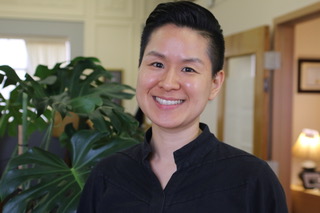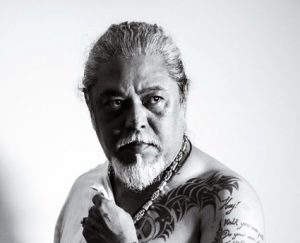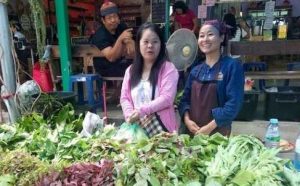This month, Rev. Grace Song attended the 2024 “May We Gather” pilgrimage, a national memorial held in Antioch, California to honor Asian American ancestors and to give voice to the countless victims of anti-Asian bigotry, hatred, and violence throughout US history. Below are the remarks she delivered to attendees.

It’s an honor to be here today, united in a journey that calls for patience, great loving-kindness and great compassion, and an unwavering commitment to justice. Our gathering echoes a profound connection, rooted in past lives, and destined to continue in future ones.
My roots are anchored in a lineage of Korean women: caregivers, seekers of spiritual truth, and artists. Their lives, woven with both hardships and triumphs, have left an indelible mark across generations. These women defied societal norms, showing me that a woman’s place and aspirations should not be quelled by external expectations. Despite having inspiring figures in my life, I’ve battled feelings of not belonging, measuring myself against unattainable standards. I’ve faced moments where fear and deep-seated biases silenced my voice. But today marks a significant change: I stand here embracing a new mindset. My body, intertwined with universal principles in every cell, is transforming into a vessel for exploration, transformation, creativity, and liberation.
The teachings of Won Buddhism have been instrumental in this transformation, emphasizing the essential role of women in our communities and highlighting the deep spiritual connections that unite everyone. Throughout history, women have been pillars of strength, wisdom, and compassion. In Won Buddhism, they’ve often been the unsung heroes, fostering community growth and connection.
Today, I want to spotlight Ven. Yi Chong Chun, a trailblazing female disciple who lived during the formative years of Won Buddhism. Ven. Yi Chong Chun, emerging from a background of poverty, initially followed the path of a courtesan. However, a profound moment of realization led her to yearn for something deeper in life, steering her toward spirituality. Her journey to Won Buddhism was met with initial resistance, as her previous life as a courtesan was viewed with disfavor. However, the Founding Master of Won Buddhism, Sotaesan, said that the “great intent of the Buddhadharma is always to deliver all sentient beings everywhere in the spirit of ‘great loving-kindness and great compassion.’ In the world there may be both high and low classes of people as well as high and low occupations, but in the buddha-nature there are no such distinctions. If you do not understand this fundamental principle, then you are the people who are difficult to deliver.” (The Doctrinal Books of Wŏn Buddhism, 392)
Sotaesan knew the great contributions women would make in the sangha and wanted to uplift their voices and contributions, recognizing their vital role in collective healing and growth. Ven. Yi Chong Chun made a significant impact as a principal financial supporter of Won Buddhism in its initial years, advocated for gender equality among ordained clergy, and established her own temple in Jeonju, a legacy that stands today. Therefore, the robes I don today mean a lot to me as they carry the memories and sacrifices of the courageous ordained women before me. These women fought fiercely for equality, believed in their boundless potential, and remained steadfast under scrutiny.
This circle on my pŏmnak reminds me that it is time to strengthen the ties of kinship that bind us together, transcending the boundaries of race, religion, and gender. Our pilgrimage is as much about looking back and remembering as it is about looking forward and envisioning a future in which diversity is celebrated and equality is a reality for all. In coming together to honor our losses, we also affirm our collective commitment to stand against the forces of hatred and bigotry. Our gathering is an act of solidarity; a declaration that we will not let the voices of those we lost be silenced. It is a pledge to carry on their legacy by working toward a society where such acts of violence are unthinkable.
We gather in great loving-kindness and great compassion, and in the words of Master Sotaesan: “The great loving-kindness and great compassion of the Buddha radiates more warmth and brightness than the Sun. Thus, where this loving-kindness and compassion reach, the ignorant minds of sentient beings melt away into the mind of wisdom; their minds of cruelty melt away into the mind of loving-kindness and compassion; the mind of miserliness and greed melts away into the mind of generous charity; and the discriminative mind of the four signs melts away into the all-encompassing mind. Therefore, the awesome power and radiant brightness of this loving-kindness and compassion are incomparable.” (The Doctrinal Books of Wŏn Buddhism, 318–9)
Our gathering today is a promise to reconvene, time and again, in a union of hearts and minds that endures across the ages, creating a legacy of compassion and unity for generations to come. Let us gather not just in grief, but in hope and in the belief that, through our collective efforts, we can forge a path of healing, unity, and lasting peace.
We gather today, we will gather again.
Kamsahamnida. (Thank you)
References
2016. The Doctrinal Books of Wŏn Buddhism. Iksan: Wŏn’gwang Publishing.
See more
May We Gather 2024: A National Buddhist Pilgrimage for Asian American Ancestors
Related features from BDG
For the Ancestors and for Peace: A Conversation with the Organizers of “May We Gather”
American Sutra: On the Incarceration of Japanese Americans in WWII
The Birth of an American Form of Buddhism: The Japanese-American Buddhist Experience in World War II
Julius Goldwater: Protector of Japanese American Buddhists
Fostering Compassion Through Breaking Bias: Anurag Gupta Asks Us to BE MORE
“Hyphenated-American”
Related news reports from BDG
Buddhists Bring Karmic Healing to Antioch, California
Asian American Buddhists Commemorate Anti-Asian Violence and Murders with “May We Gather 2024”
Percent of Asian American Adults Identifying as Buddhist in Decline According to New Study
North American Buddhists to Offer Memorial Ceremony for Asian American Ancestors on 4 May
Japanese Americans Commemorate Remembrance Day
Buddhist Artist Bernice Bing Receives Solo Show at the Asian Art Museum














